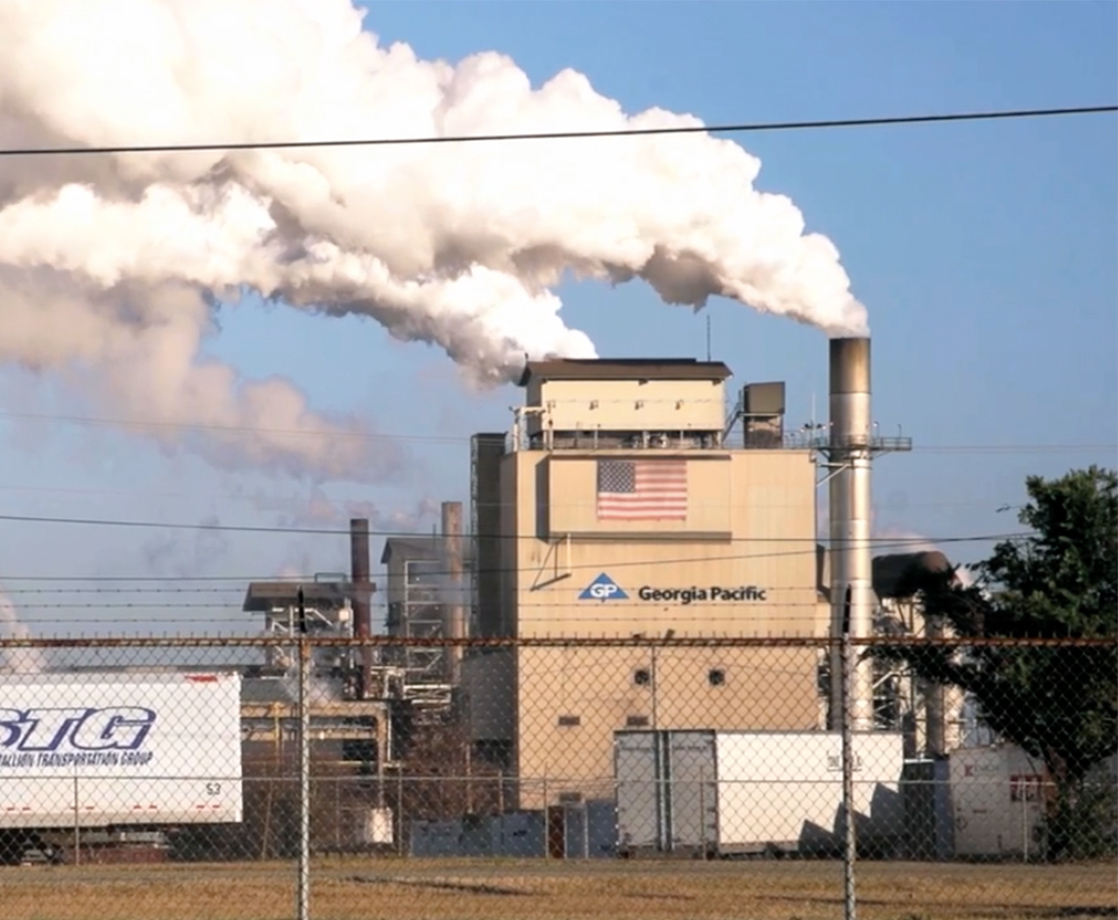Earlier this year, President Trump appointed former Oklahoma Attorney General Scott Pruitt to head the Environmental Protection Agency (EPA), a move that's been criticized by countless people due to Pruitt's track record of being an anti-environmentalist. The New York Times has gone so far as to say that Pruitt is on a mission to roll back regulations that are protecting our nation's environment and public health, working hand in hand with big business to enrich the elite, and poison the public with pollution. Often times, these big polluters are in bed with big decision makers like Pruitt, who are more than willing to look the other way.
A new film, Company Town, which premieres September 8 at New York's Cinema Village, documents how Georgia Pacific, a paper and chemical plant operated by Koch Industries, has been polluting the water and air in Crossett, Arkansas for decades. When filmmakers Natalie Kottke-Masocco and Erica Sardarian first started filming, residents were afraid to participate in the community meetings led by Pastor Bouie and Cheryl Slavant. But as the filmmakers started to uncover the widespread pollution plaguing the city, with help from scientists who began to reveal all the toxic chemicals in the land, air and water, the Crossett residents became more vocal and fearless.
One of the subjects in the film, Reverend Smith, whose 9-year-old daughter was diagnosed with cancer, states in a big town meeting with all the government agencies present, "Some of us say we might be afraid of Georgia-Pacific. What can they do… what they're already doing to us?" It's a pivotal and powerful moment, one that spotlights the community as it rose and united as one. The filmmakers see this as just the beginning of the Crossett citizens taking action against the harm done to them, and they're continuing to put pressure on the EPA to act, getting attorneys on board, and fighting hard for the justice they deserve.
MERRY JANE talked to the filmmakers about how they got involved in covering the insidious situation in Crossett, if they had concerns taking on the notoriously vengeful Koch Brothers, and how prevalent similar situations like what's happened in Crossett are affecting communities across the nation.
MERRY JANE: When did you first discover and get interested in this story, and more importantly why did you decide to make a film about it?
Natalie Kottke-Masocco: I first stumbled upon the community in Crossett 6 years ago while I was working on Koch Brothers Exposed. I was producing a small segment on the Koch Brothers environmental catastrophes and I was researching different plants across the country. I called the main subject of the film, Pastor Bouie, and he said I don't know you and I won't speak to you. I flew there two days later. And when I was there I started knocking on doors and it was like door-to-door cancer. On Bouie's street alone 11 out of 15 homes has a cancer-related death. I felt totally sickened and terrified and thought it was really wrong. I believed I had a moral responsibility to follow the story. I stayed on it for five years. It was really horrifying and after learning about people's stories I felt that I had to help and shine a light about what's going on there with the deaths from the pollution.
Erica Sardarian: I initially heard about Crossett through my dear friend and co-director, Natalie. She completed a film with Robert Greenwald called Koch Brothers Exposed where she discovered this small community filled with cancer linked to the Koch Industries-owned plant, Georgia-Pacific. The Crossett story was a short segment in the film. The main subjects, Mr. and Mrs. Bouie, and the Ouachita Riverkeeper, Cheryl Slavant, along with the community, became her family and she knew there was a larger issue there and wanted to continue telling their story.
I was moving back to LA from New York, and I wanted to work on something that was meaningful and impactful. Natalie asked me to partner with her and co-direct the film. I was drawn to the story and moved by the Bouies and the entire town. I couldn't believe this was happening in America, and I wanted to do something. I wanted to be part of this movement. It's very rare in life you get to work on something that fills your soul. It was the best decision I ever made — both personally and professionally. We teamed up with my brother, Edgar, who shot, edited, and produced the film with us, and that's how this beautiful journey all started.
Did you have any concerns about airing the dirty laundry of the Koch Brothers, who are very rich, very politically connected, and very powerful men in this country?
Natalie: They are a couple of really scary guys. I didn't let that fear get to me. I was so strongly moved by the people in Crossett and the stories they're telling. They live in this town and their paychecks come from this company that is killing them. It was their bravery and courageousness that inspired me to make the film. There was story after story after story about workers getting cancer. You have to put a light on the dirty secrets of the past so that we can transcend them, heal, and move beyond that and get justice for the people's lives that were affected by this company.
Erica: My goal and our goal as a team from the beginning was to tell a thoughtful story about a small, hidden American town plagued with cancer and illness linked to one of the largest corporations in America, one that happened to be owned by Koch Industries. Our intention from the beginning was to tell this story as investigative journalists and filmmakers and uncover the truth. Including all the Kochs' environmental crimes was part of telling that story, and staying true to that was important. Being afraid to reveal certain things because of what the Kochs might do wasn't really a concern of ours. The challenge, at times, was finding the balance of how far we should push, because we collectively did not want to make an anti-Koch film. We wanted to provide the information and have our smart, politically-informed audience put the pieces together. I think we did a great job of being mindful of that and including pertinent information that made the most sense for our story.

How prevalent do you think situations like Crossett are around our nation, and how can we learn from what's happened there?
Natalie: We touch on it a little in the film, but this is happening all across the country. People suffering at the hands of the company. One of the most recent examples is Flint, Michigan. People are gravely sick due to contamination in the water supply, and government officials just turned the other way when they knew the water was contaminated. Just like Crossett, it has affected mostly African-American communities. When it comes to big industries and certain communities, government officials are looking the other way. It goes all the way back to the Erin Brockovich movie. That went on the national radar and now there are more and more of these. This is happening all across the country. It represents whats going on across the country. People suffering from pollution due to big business.
Erica: Environmental injustice, coupled with economic injustice, is happening all across America. We've seen it with Hinkley, California, Love Canal, and Flint, Michigan, where small communities are being preyed upon by big business. It is a human right to breathe clean air and drink clean water, and there are so many communities that are being robbed of that right. Working on this film and hearing about other communities fighting the same fight as Crossett forced me to be more aware of what is going on in my own community and to not be afraid of standing up and fighting for justice. I'm so inspired by the strength and resilience of the people in Crossett.

What takeaways do you want viewers to come away with after watching the film?
Natalie: Our hope with the film is to have Crossett in the national discourse. We want people to act and make a difference. There is a civil rights petition at the EPA civil rights desk, and on our website you can take action with the EPA for Crossett residents. We want people to take action after watching this film. If they're angry, if they're emotional, if they're upset, we want people to take action and utilize that. Our goal is to clean up Crossett, and the more people that call, the more people that take action will put more pressure on the EPA to clean up Crossett.
Erica: The goal of our film has always been to clean up the community, relocate citizens who are deeply affected by the pollution, and modernize technology at the mill. The film is a tool to put pressure on the EPA to enforce the law and implement stricter standards for emission. What I want people to take away from this film is that we all need to act. We all need to help each other. To have empathy for one another. What would you do if the company you were working for and was putting a paycheck in your pocket was poisoning you? What the people in Crossett are experiencing every single day and the toxins they are consuming is criminal. I want people who watch this film to be inspired to act and to help us clean up Crossett and other towns across America that are being polluted by big business.
For more on "Company Town," including ways to get involved with supporting the community, visit the documentary's website here.
Follow Seth Ferranti on Twitter











